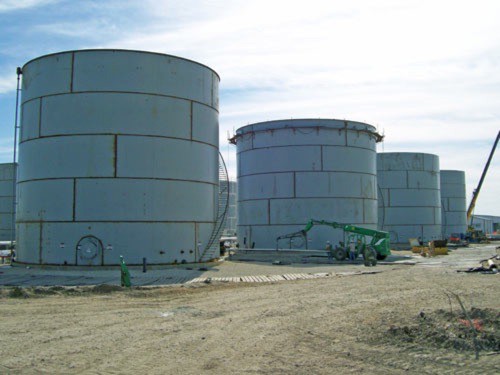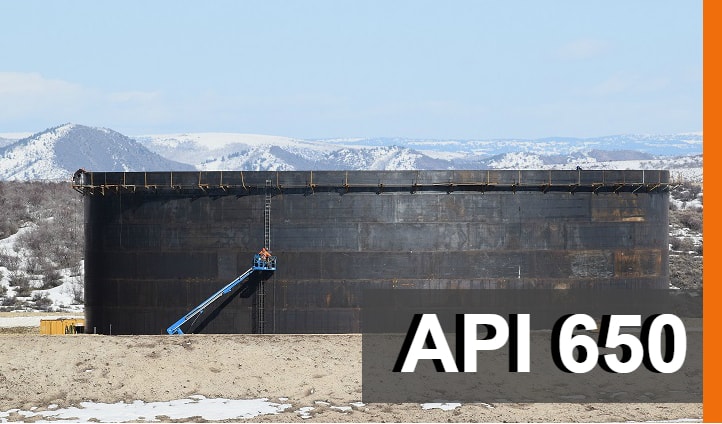How API 650 Welding Inspection Enhances Durability of Welded Structures
The Benefits of Welding Examination for Boosted Safety and Efficiency
Welding examinations are crucial for ensuring that structures meet rigorous industry criteria. They play an essential duty in determining problems early, thereby boosting security and decreasing the threat of disastrous failures. In addition, these assessments can result in substantial expense savings by protecting against expensive repairs and downtime. As companies aim for better performance and integrity, the significance of a durable evaluation procedure can not be overstated. What various other benefits might emerge from a dedication to extensive welding inspections?
Making Sure Compliance With Market Requirements
Guaranteeing conformity with sector standards is crucial for maintaining high quality and safety and security in welding projects. Complying with established procedures not just shields workers however additionally enhances the sturdiness and efficiency of the last product. Welding evaluations performed at numerous stages of the process assistance determine any kind of deviations from these standards, allowing timely restorative activities. This aggressive approach reduces the danger of failures that might arise from substandard workmanship.
Compliance with industry criteria cultivates trust fund amongst stakeholders, consisting of customers, regulative bodies, and the workforce. It represents a commitment to excellence and responsible techniques, which can bring about boosted service chances and an one-upmanship in the market - API 650 Welding Inspection. Normal inspections also assure that strategies and products utilized align with the newest technical innovations and safety and security regulations. Inevitably, adherence to market standards is not just a governing requirement yet a foundation of quality assurance in welding tasks
Enhancing Security Through Very Early Detection of Flaws
While the primary objective of welding assessments typically focuses on conformity, they play an important duty in improving safety and security by allowing the very early detection of issues. Determining concerns such as incomplete blend, cracks, or porosity throughout inspections can considerably mitigate the danger of catastrophic failures. Early discovery enables timely treatments, ensuring that malfunctioning welds do not compromise structural stability.
In addition, systematic assessments foster a culture of security within companies by emphasizing the significance of top quality control. This aggressive method not only secures employees but likewise safeguards the surrounding atmosphere. Normal inspections can reveal patterns in flaw event, enabling adjustments in welding techniques and training programs to attend to underlying problems.
Welding inspections offer as a critical safeguard, bolstering overall safety and performance by recognizing issues prior to they rise right into major dangers. This commitment to quality straight adds to the long life and dependability of welded structures.
Decreasing Costs by Avoiding Failures
By applying extensive welding inspections, companies can properly decrease costs connected with failings and remodel. The proactive recognition of flaws during the welding procedure lessens the risk of tragic failures that can result in pricey repair services or replacements. Early discovery enables prompt interventions, which protects against the acceleration of small problems right into major problems that strain spending plans and resources. Furthermore, by ensuring that welds satisfy specified requirements, companies can avoid hold-ups in project timelines triggered by the demand for comprehensive rework or added inspections later on in the procedure. This not only saves cash but likewise boosts operational effectiveness. In addition, a credibility for high quality handiwork can lead to boosted consumer complete satisfaction and repeat service, more adding to financial stability. Generally, purchasing welding examinations is a strategic approach that fosters cost savings while protecting the stability of welded structures.
Improving Performance and Longevity of Frameworks


Welding evaluations play an important duty in enhancing the efficiency and longevity of frameworks, as they verify that welds are executed to the greatest standards. By determining issues early in the welding process, examinations avoid weak points that could jeopardize architectural integrity. This positive strategy guarantees that the materials made use of meet needed requirements, thus enhancing their load-bearing ability and resilience.
Additionally, regular monitoring of welding practices adds to the overall quality of building tasks. When welds are validated for conformity with sector standards, the potential for fatigue and failure in time is considerably lowered. Frameworks that are constructed with effectively evaluated welds are most likely to experience less maintenance problems Full Report and enhanced sturdiness.
Inevitably, extensive welding evaluations not only bolster the prompt performance of a structure but additionally prolong its operational life-span, giving long-lasting value to both builders and end-users alike.
Cultivating a Culture of Top Quality and Dependability
A commitment to top quality and dependability in welding practices substantially adds to the overall success of building projects. They promote a society that encourages thorough interest to information and adherence to industry requirements when organizations prioritize these worths. This culture not just boosts the skill degree of welders but likewise advertises accountability and synergy amongst all stakeholders included in the task.

Normal welding examinations offer as a keystone in this social change, strengthening the value of constant performance and safety measures (API 650 Welding Inspection). By implementing rigorous inspection methods, firms can determine prospective flaws early, mitigating risks and staying clear of pricey rework. A focus on top quality and dependability instills self-confidence among companions and customers, leading to more powerful partnerships and boosted track records.
Connections Eventually, cultivating a culture of quality and integrity in address welding techniques not only boosts job end results however additionally ensures lasting sustainability and success in the building sector.
Often Asked Inquiries
What Certifications Should a Welding Assessor Have?
A welding inspector must have pertinent certifications, such as AWS CWI or CSWIP. Additionally, they need to have experience in metallurgy, welding procedures, and examination methods, along with strong analytical skills and attention to detail for effective evaluations.

Just How Commonly Should Welding Inspections Be Carried Out?
Welding inspections must be conducted regularly, ideally after each substantial phase of the welding procedure. Additionally, regular assessments ought to take place based on job needs, service problems, and regulatory requirements to assure ongoing high quality and safety and security.
What Equipment Are Made Use Of During Welding Inspections?
Welding evaluations make use of various tools, consisting of ultrasonic testers, magnetic fragment testers, aesthetic examination tools, and radiographic devices. Each device offers a specific function, making certain weld quality and structural stability via thorough evaluation and analysis.
Can Welding Inspections Be Executed Remotely?
Welding evaluations can undoubtedly be done from another location making use of advanced technologies such as drones and specialized video cameras. These devices allow assessors to analyze welding top quality and honesty from a range, boosting performance and safety and security in various settings.
What Are the Usual Kinds Of Welding Issues?
Usual kinds of welding issues consist of porosity, splits, insufficient combination, undercutting, and slag addition. These problems can compromise the integrity and toughness of welds, bring about possible failings in structural applications if not addressed properly.
Welding inspections are essential for making certain that frameworks satisfy stringent sector criteria. Welding assessments conducted at various phases of the process help browse around this site recognize any type of discrepancies from these criteria, making it possible for timely corrective activities. Welding evaluations play a vital role in boosting the performance and long life of structures, as they confirm that welds are implemented to the greatest criteria. Welding assessments should be conducted regularly, preferably after each significant stage of the welding process. API 650 Welding Inspection. Welding assessments utilize various devices, including ultrasonic testers, magnetic bit testers, aesthetic evaluation devices, and radiographic equipment